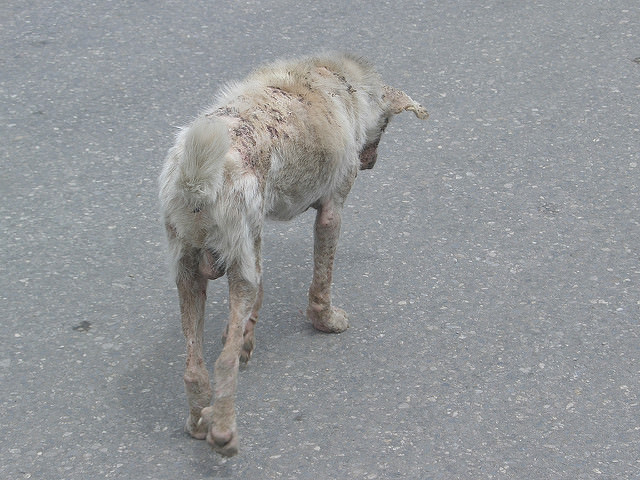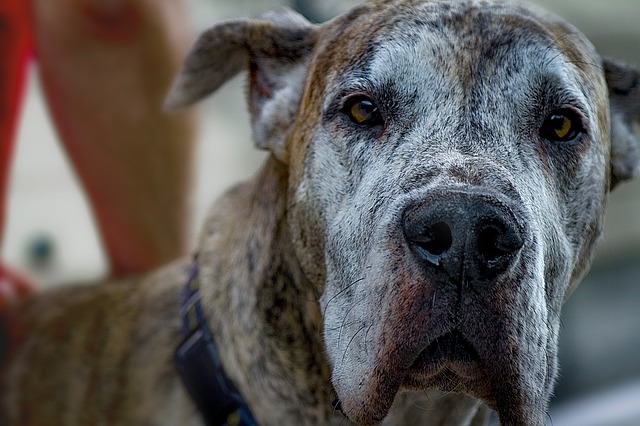Whether you notice it as it happens or not, hair doesn’t just disappear overnight. Sudden bald patches or thinning fur on your dog’s body may be cause for alarm in a loving owner – but don’t panic! Your dog’s fur didn’t just pack up and walk away – and it’s not going to come back without some attention. Here are 5 common causes of hair loss in dogs that you can discuss with your vet if you notice your dog’s coat is thinning.
#1 – Fleas
Fleas are a very common cause of hair loss for animals. Ctenocephalides felis (cat flea) has a very irritating bite and causes intense itching. The dog will then scratch, rub or bite the area until the hair is gone and sometimes so is the top layer of skin! You might not see any fleas or even evidence that they were there, but if your dog is not on a veterinary purchased flea product, fleas have left their itchy mark on your dog. Such a small fraction of the flea life cycle is actually spent on the dog that most people do not know that fleas are the root of the problem. A dog can pick up a flea in a quick potty break outside and you can bring in fleas on your pants legs. A flea’s only goal is to bite your dog (or even you) to keep that life cycle going.
#2 Inhalant allergy (atopy)
Another cause of hair loss, many of my atopic patients are allergic to pollens, molds and dust and the allergy causes itching. The itching will lead to hair loss because of irritation and secondary infection. Atopy is not a curable condition, but can be effectively managed with your vet’s help. Avoiding the cause of atopy might not be feasible, but there are medications to help manage it and restore your dog’s hair and quality of life.

#3 Demodectic Mange
Demodex mite that can live on normal skin, but if a dog lacks an effective immune response to it, the mites overgrow and cause itching and alopecia (hair loss). Many times you will notice patchy hair loss around a young dog’s eyes or scattered over his body. Your vet can find this mite on affected dogs’ skin with a skin scraping and a microscope.
# 4 Sarcoptic mange
Caused by a different mite, called Sarcoptes scabiei, this is contagious among dogs. Dogs with sarcoptic mange are very itchy with patchy hair loss. It is considered zoonotic (contagious to humans) too, but don’t worry. It does not like to live on people and won’t make all of your hair fall out. If your dog has hair loss, you should make absolutely certain that it is not because of sarcoptic mange. See your vet and if he/she suspects sarcoptic mange, you may need your physician too.

#5 Endocrine disease
Disorders of your dog’s hormone and metabolic systems, known as endocrine disease, can also cause hair loss. The term “endocrine disease” encompasses some big issues, like Cushing’s Disease and hypothyroidism. These disorders are very important and must be uncovered as soon as possible to allow for the best clinical outcome. These types of alopecia tend to be non-inflammatory, i.e. the skin looks fairly normal, but the hair appears to have just fallen out. Other causes of alopecia that are technically classified as “endocrine” are not as harmful, but you need your vet to help you decide. Unexplained hair loss is not something that should be allowed to continue without medical supervision.
Some of our veterinary flea control products also have coverage for certain mites, so ask your veterinary professional if you think that fleas are the primary issue. A dog with missing hair will need to be examined by a veterinarian to protect him and your human family. Diagnostic testing can find the root cause and appropriate treatment can be started early in the process to save your dog needless discomfort. Hair loss is not something that should be ignored. Ask your vet to be sure that your dog is safe.
Please look me up on Twitter, Facebook and Google+ . I love hearing about your pets!

